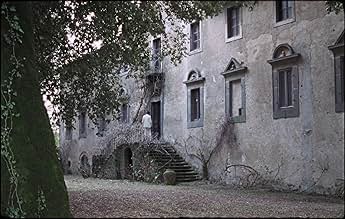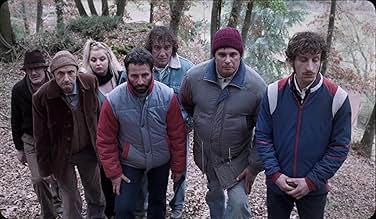Der englische Archäologe Arthur trifft sich wieder mit seinen unberechenbaren Komplizen - einem fröhlichen Kollektiv von Grabräubern, die durch das Plündern etruskischer Gräber und das Horte... Alles lesenDer englische Archäologe Arthur trifft sich wieder mit seinen unberechenbaren Komplizen - einem fröhlichen Kollektiv von Grabräubern, die durch das Plündern etruskischer Gräber und das Horten der ausgegrabenen antiken Schätze überleben.Der englische Archäologe Arthur trifft sich wieder mit seinen unberechenbaren Komplizen - einem fröhlichen Kollektiv von Grabräubern, die durch das Plündern etruskischer Gräber und das Horten der ausgegrabenen antiken Schätze überleben.
- Regie
- Drehbuch
- Hauptbesetzung
- Auszeichnungen
- 14 Gewinne & 53 Nominierungen insgesamt
Empfohlene Bewertungen
La Chimera is a slow burning journey with plenty to say that's deliberately hard to pin down, making it all the more rewarding when it coalesces. Coincidentally, it's also the best film released in the last year about a grizzled archaeologist returning to recovering ancient artefacts on one last adventure whilst still grieving the loss of a loved one.
Josh O'Connor is so good at being reserved without being completely closed off. The only real emotion that he shows is anger but everything else is so clearly contained in his anguish and charming smile. He's supported by a crew of boisterous personalities who are initially a lot of fun to be around though not without their darker sides.
Alice Rohrwacher's direction draws you in and keeps you so invested that the subtle aspect ratio shifts almost go unnoticed. It's simultaneously a film that's very grounded with stunning locations which all feel lived in and at the same time has it's more surreal moments that imbues the film with a dreamlike nature, especially in its final moments.
Josh O'Connor is so good at being reserved without being completely closed off. The only real emotion that he shows is anger but everything else is so clearly contained in his anguish and charming smile. He's supported by a crew of boisterous personalities who are initially a lot of fun to be around though not without their darker sides.
Alice Rohrwacher's direction draws you in and keeps you so invested that the subtle aspect ratio shifts almost go unnoticed. It's simultaneously a film that's very grounded with stunning locations which all feel lived in and at the same time has it's more surreal moments that imbues the film with a dreamlike nature, especially in its final moments.
Poetry is the first word that comes to mind when trying to describe that movie. Alice Rorhwacher depicts a world where past and present are interwoven. A forgotten rural Italy, haunted by the remnants of Antiquity. The movie is full of symbols, and the boundaries between past and present, life and death, reality and fantasy are constantly blurred.
The main character, Arthur, is marked by grief, and hides his pain among a band of gentle thieves. All around him, there is misery but also resilience, joy, survival. In this picaresque landscape, Arthur seems to be the only character inhabited by tragedy.
Rorhwacher has the power to evoke emotions that are hard to describe. I left the theater in a contemplative state and I've been thinking about the movie a lot since then. Only good movies can do that.
The main character, Arthur, is marked by grief, and hides his pain among a band of gentle thieves. All around him, there is misery but also resilience, joy, survival. In this picaresque landscape, Arthur seems to be the only character inhabited by tragedy.
Rorhwacher has the power to evoke emotions that are hard to describe. I left the theater in a contemplative state and I've been thinking about the movie a lot since then. Only good movies can do that.
"La Chimera" is a bittersweet addition to the magical-Italian-realism cinematic universe of director Alice Rohrwacher. Her new parable about Italy that's also a folklore fairytale tells the story of clairvoyant/haunted archeologist/graverobber Arthur, played by Josh O'Connor. Arthur's journey to retrieve the film's buried namesake is not one for glory and it's barely for riches; O'Connor commits both emotionally and physically to a naturalistic portrait of a lost man searching for something that is beyond the tangible. This heavy-hearted quest is balanced thanks to moments orchestrated by Arthur's local gang of merry graverobbers, played by former collaborators from Rohrwacher films. Another great performance is by Isabella Rosellni, playing a women that is connected to Arthur through personal history and in her attachment to living in the past. The film is far less narrative-driven, instead choosing to follow Arthur from one moment to another, a nod to the wandering man of other Italian greats, Pasolini and Felini. The ending, similarly, leaves viewers with the choice of deciding whether Arthur was victorious in fulfilling his wish or not.
I did enjoy this movie. Josh O'Connor and all of the cast deliver stellar performances. I settled down to watch a slow burn and indeed it is just that, but maybe a little to slow. I found myself hoping something more would happen. Every actor in this movie is wonderful, but towards the last half hour I just wanted it to wrap up. When it finally did wrap up, it was a bit of a damp squib. It was obviously coming and was no surprise. Most of the dialogue is Italian but subtitles don't worry me. Everything about this movie is great and I would not point fingers at the script writers or the actual dialogue. I just had issues with the strength of the actual story line. I think it may become a lost gem. It does not have mass appeal, but that is a trademark of Josh O'Connor; he just does the stuff that he wants and what challenges him. I cannot think of anything I have seen him in that was not brilliant, and this movie is up there, but only for a limited and mainly Italian audience. However, happy it was made. It is original, beautifully cast, thoughtful sets and wardrobe. Thanks.
Arthur, the disheveled former archaeologist turned Etruscan tomb-finder, is a man on a quest. When we first meet him, he is dreaming on a train heading home after being released from prison. Once home, he soon falls in with his old gang of tombaroli (grave-robbers) and they're on the search for treasure in the earth. For the rest of the gang, treasure means loot from Etruscan tombs; Arthur seems to be searching for something else. We get clues to Arthur's search in recurring images of a young woman and her red thread first seen in the opening shots of the film. The woman, we soon learn, is Beniamina, the daughter of Flora and Arthur's beloved. Flora lives in a crumbling palazzo with Italia, her singing student, and a group of women who call Flora mother. Italia is being exploited as a servant by Flora, who believes she is tone-deaf, but Italia in turn is raising two children in the house unbeknownst to Flora. The film juxtaposes these two kinds of groups: the rival groups of tombaroli led by men and the communal groups led by women (Italia forms the second group in a disused railway station), which echoes the remark early in the film that Italy would be much less macho today if the Etruscans had beaten the Romans rather than the other way around.
The film is full of mythic and historical resonances. Arthur is a latter-day Orpheus searching for his Eurydice (the first musical cue is from Monteverdi's Orfeo), but without Orpheus's gift of music. The red thread recalls Ariadne and the labyrinth. Flights of birds (and ominous pigeons) follow Arthur. Italia's first language is Portuguese and her children are of many ethnicities. And so on. In the hands of a lesser director or screenwriter this hybrid creature of different parts (you might call it a chimera) could have been a mess, but here everything seems to cohere and to create a mythic world that resembles our own, but is at an angle to it. That everything clicks into place so precisely and beautifully in the final scene is a tribute to just how tightly this loose-seeming film is constructed. Rarely have the loose threads of a plot been gathered with as much skill or in a more satisfying way.
Many of the photographic tricks (different film stocks, different aspect ratios, scenes undercranked) sound gimmicky, but, except for the undercranking, most are there for people who notice and transparent to those who don't. The cast is uniformly excellent.
For all its playfulness and its conceits, this moving, elegiac film tells the story of a great love and is a great love story.
The film is full of mythic and historical resonances. Arthur is a latter-day Orpheus searching for his Eurydice (the first musical cue is from Monteverdi's Orfeo), but without Orpheus's gift of music. The red thread recalls Ariadne and the labyrinth. Flights of birds (and ominous pigeons) follow Arthur. Italia's first language is Portuguese and her children are of many ethnicities. And so on. In the hands of a lesser director or screenwriter this hybrid creature of different parts (you might call it a chimera) could have been a mess, but here everything seems to cohere and to create a mythic world that resembles our own, but is at an angle to it. That everything clicks into place so precisely and beautifully in the final scene is a tribute to just how tightly this loose-seeming film is constructed. Rarely have the loose threads of a plot been gathered with as much skill or in a more satisfying way.
Many of the photographic tricks (different film stocks, different aspect ratios, scenes undercranked) sound gimmicky, but, except for the undercranking, most are there for people who notice and transparent to those who don't. The cast is uniformly excellent.
For all its playfulness and its conceits, this moving, elegiac film tells the story of a great love and is a great love story.
Wusstest du schon
- WissenswertesJosh O'Connor filmed the first half of La Chimera prior to filming his role as Patrick Zweig in Challengers, then returned to Italy to complete the second half.
- Soundtracks'Toccata-Ritornello-Sinfonia' from 'L'Orfeo'
Composed by Claudio Monteverdi
Performed by Le Concert des Nations & La Capella Reial de Catalunya
Conducted by Jordi Savall
Top-Auswahl
Melde dich zum Bewerten an und greife auf die Watchlist für personalisierte Empfehlungen zu.
- How long is La Chimera?Powered by Alexa
Details
- Erscheinungsdatum
- Herkunftsländer
- Sprachen
- Auch bekannt als
- La quimera
- Drehorte
- Produktionsfirmen
- Weitere beteiligte Unternehmen bei IMDbPro anzeigen
Box Office
- Budget
- 9.600.000 € (geschätzt)
- Bruttoertrag in den USA und Kanada
- 1.004.503 $
- Eröffnungswochenende in den USA und in Kanada
- 44.511 $
- 31. März 2024
- Weltweiter Bruttoertrag
- 5.234.879 $
- Laufzeit2 Stunden 11 Minuten
- Farbe
- Sound-Mix
- Seitenverhältnis
- 1.78 : 1
Zu dieser Seite beitragen
Bearbeitung vorschlagen oder fehlenden Inhalt hinzufügen






























